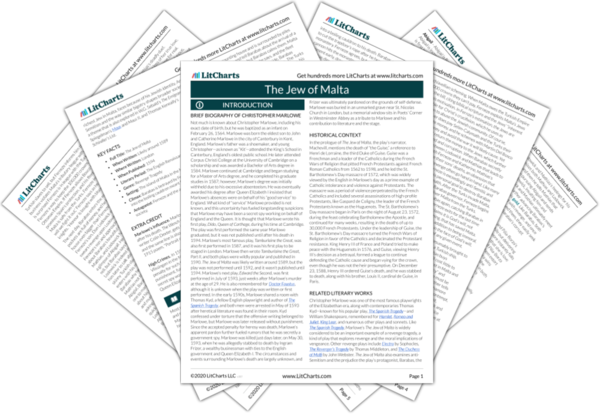Throughout The Jew of Malta, Marlowe repeatedly alludes to protagonist Barabas’s enormous nose, which symbolizes the bigotry Barabas faces as a Jewish man in 16th-century Malta’s anti-Semitic society—and in 16th-century England as well. Marlowe’s play takes place in Malta, but the narrator, Machevill, addresses an English audience, and the prejudice Barabas and the other Jews endure mirrors that of the bias in England during Marlowe’s time. Barabas embodies only the worst Jewish stereotypes—chief among them his huge nose. A large hook nose is common among many people of Mediterranean descent, not just Jews, yet this offensive trait is often present in caricatures of the Jewish community, and Barabas is no exception. When Barabas tells his Turkish slave that he enjoys killing Christians in his spare time, an excited and hateful Ithamore says: “Oh brave, master, I worship your nose for this.” Ithamore’s reference to Barabas’s nose is clearly a slight against Barabas’s Jewish identity, just like his comment when Barabas claims to smell the friars, Jacomo and Bernardine, approaching from the convent. “God-a-mercy nose,” Ithamore says under his breath.
Presumably, Ithamore’s references to Barabas’s nose are jokes, and such comments likely garnered big laughs in Marlowe’s day, but this harmful stereotype also reflects the anti-Semitism that pervades both the play and England during the 1500s. Many scholars believe that Marlowe’s representation of Barabas was meant to highlight England’s rampant prejudice to expose and overcome it, but it is difficult to sympathize with Barabas and his untimely death. Barabas is a despicable man who plots, schemes, and murders without a second thought. He is the epitome of the “wicked Jew” whom Marlowe’s Christian and Muslim characters fear and hate, and least offensive of these hurtful stereotypes is his unattractive nose. In the end, Barabas does not have one redeemable quality, and Marlowe’s overtly biased representation—beginning with Barabas’s oversized nose—not only reveals the anti-Semitism plaguing both the play and England during the 1500s but also bolsters and reinforces the same prejudice it exposes, ultimately perpetuating hate instead of overcoming it.
Barabas’s Nose Quotes in The Jew of Malta
Act 2, Scene 3 Quotes
Barabas: Hast thou no trade? Then listen to my words,
And I will teach that shall stick by thee:
First be thou void of these affections,
Compassion, love, vain hope, and heartless fear,
Be moved at nothing, see thou pity none,
But to thyself smile when the Christians moan.
Ithamore: Oh brave, master, I worship your nose for this.
Act 3, Scene 3 Quotes
Ithamore: Oh mistress! I have the bravest, gravest, secret, subtle, bottle-nosed knave to my master, that ever gentleman had.
Abigail: Say, knave, why rail’st upon my father thus?
Ithamore: Oh, my master has the bravest policy.












